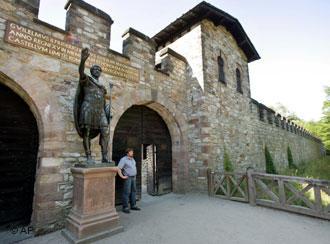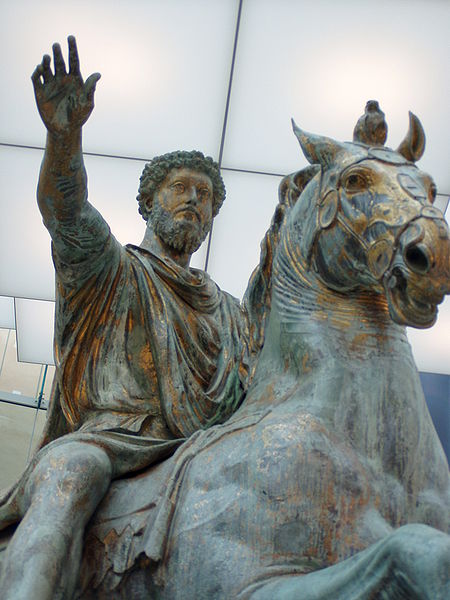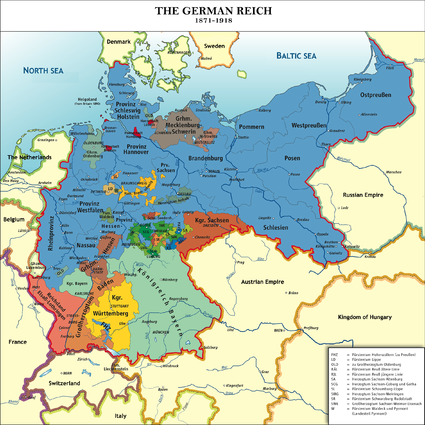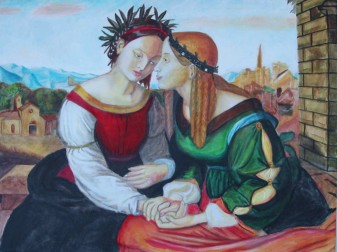
Germany: the Discordant Nation
An historical tragedy, the whole centuries-old tragedy of the German nation, stems from its being historical out of step with the other great nations of Western Europe. And this temporal mismatch has in its turn arisen from basic uncertainty over the space it occupies.
The difficulties that mark the coexistence of Germany with its European partners are not due only to socio-economic factors: lower German wages and gigantic trade surpluses; Spanish megalomania and Greek fiscal inefficiency; Italian diplomatic amateurism and French suffocating bureaucracy. Long-term historical phenomena also play a major role in setting the Germans on a path different from the great West-European Nations.
Let’s therefore give a look at geography first. Germany is that vast stretch of land at the heart of Europe where throughout antiquity the German tribes which came down from Scandinavia spread out, thus becoming the “continental Germans”. This huge territory has no natural borders to its West or East. The only barrier, the Alps, is along its southern flank. But the Alps are themselves not impassable.
The German tribes thus expanded across this space in the directions where they encountered the least resistance. Eastwards, they pushed out two far-reaching tentacles. One tentacle reached Silesia where several German communities established themselves in a territory already settled by Slavs – today’s Poles – which in the course of history was later incorporated in the Kingdom of Bohemia, then in the Hapsburg Empire, then into Prussia.
The other eastern tentacle, along the shores of the Baltic eventually reaching the Gulf of Finland, was Prussia itself, which was founded by the Teutonic Knights in the thirteenth century, through an alliance with another military-religious order, the Fratres Militiae Christi, also known as the Knights of the Sword.
These extensions were at times so important that they gave birth not only to new provinces but to new nations as if by parthenogenesis.
Thus in the West the world of lower Germany expanded so far that it finished up by creating the Netherlands, a new nation which escaped and was itself destined in its turn to split into the northern and southern Netherlands. In the centre the Germanic wave spread into the Alps and diversified to the point of giving birth to two nations, the Helvetian and the Austrian. All these extensions were like canals through which the Germanic mass flowed whenever the dikes that constrained it broke open.
Historically the first of these dikes was the Roman Empire. As soon as he was in Gaul Caesar was faced with the task of repelling Ariovistus who had crossed the Rhine into Alsace. Without Caesar’s conquest of Gaul and the Roman Empire it is certain that the German tribes would have invaded Gaul as early as the first century of the Christian Era. The Roman Empire was the origin of the first great split in Germany’s, a history which was to be marked by an endless series of fractures.
The Original Fracture
In spite of the disastrous defeat suffered in the year 9 of the CE under Emperor Augustus, by the Roman general Varus, who lost three legions and his own life when ambushed by a tribal chieftain of the Cherusci tribe, Armin, in the Tetainutoburg forest, another Roman General, Germanicus, immediately re-conquered the whole of Germany.
But Emperor Tiberius, who had succeeded Augustus, was jealous of the popularity of his general. With the pretext that the profits from the occupation of Germany did not cover the expenditure this required, he therefore decided to withdraw his legions to the Rhine in the West and to the Danube in the South. Thus were created the well known “limes”.

The entire Limes wall is 550 kilometers long and runs through what are today five German states
Thus, Germany was cut into two parts, one subject to Roman rule and culture, and consequently to all the civilising influence of the Mediterranean basin beginning with Christianity which had reached there in the first centuries of our era, and another part which was shut in upon itself, faithful to its own gods and culture and remained closed to Christianity.
This division of Germany was to last for eight centuries. Even the collapse of the Roman Empire did not put an end to it. That had to await Charlemagne’s great campaigns against the Saxons. It was in fact Charles “King of the Franks and Lombards”, a German from Aix-la Chapelle, who took on the task of reuniting the whole German population under his rule, not only in a political union but equally by forcing the adoption of Christianity upon the people he had subjugated.
To understand completely the atrocity of the wars of conversion waged by Charlemagne and his successors one should not only recall the fighting, the massive slaughter of prisoners and hostages and the deportation of entire populations. It is also necessary to revisit the decree of 785 by which Charles ruled the provinces which were subject to the new faith.
Whoever enters a church with violence and removes anything by force or theft, or burns the building shall be put to death. Whoever kills a bishop, priest or deacon shall be put to death. Any non-baptised Saxon who tries to hide among his compatriots and refuses baptism shall be put to death.
Whoever plots with the pagans against Christians shall be put to death. Whoever fails to show the loyalty he owes to the king shall be put to death.
Thus was achieved the first reunification of Germany after its division by the Roman Empire. Although officially eliminated the fracture between the two parts remained deep.
The foundation of the “Second Reich” took place 621 years after the end of the first, the one founded by Charlemagne, which collapse de facto, if not legally, in 1250. And immediately Bismarck attempted to violent reject Catholicism Church seen as the channel for Roman and western values, which were deemed contrary to the true spirit of Germany. Thus, at a time when France was preparing to proclaim its secularity, the outcome of the Enlightenment’s tolerance, Germany embarked upon another religious conflict.
In the West and South, that is in the parts which were formerly Roman, the acceptance of Latin concepts of law and order had been gaining ground for centuries and Christianity had made regular inroads into the population in the shadow of the Roman empire. Beyond this frontier Christianity and the new ideas of law were cultural elements imposed by force and terror. Two different psychologies were to result from this and the rupture was to persist down through the years to the point where it re-emerged eight centuries later.
A discordant undertaking.
Once he had brought about the union of Germany, Charles set out on a course that was unintentionally out of step with history and even ran counter to it. After the collapse of the Roman Empire – paradoxically as a result of its battering by Germanic invasions – Europe had fallen into such a state of chaos and misery that the only way to put an end to its troubles seemed to be to re-establish a Roman empire.
Thus restoration of this empire appeared to be the duty of the most powerful prince. Alcuin persisted in convincing Charles of this and he had himself crowned in Reims at Christmas in the year 800.
Although Charles’ empire collapsed not much longer after his death, the Imperial ideal survived him, and was taken up again immediately by Othon the First. As king of Germany and the most powerful sovereign in Europe he saw it his duty to be crowned emperor in 962.

The Roman Empire founded of old by Augustus, then re-established by Charlemagne was thus founded one more time by Othon. It was the reconstruction of a reconstruction. In the course of time, as a rival to Byzantium, it came to be called the Holy Roman Empire in order to underline its Christian dimension and from the fifteenth century when in practice it was reduced to the Germanic populations it became known as the Germanic Holy Roman Empire.
Officially it was nothing other than the second renaissance of the Roman empire in the West. And from the coronation of Othon onwards the whole of German history was reduced to the superhuman effort to impose on Europe and the Mediterranean basin the new imperial power embodied in Germany.
The German Caesars identified themselves with this mission. Perhaps it was most clearly formulated in the speech delivered to the senators in the Roman Republic on 13 June 1154 by Othon’s distant successor, the celebrated Friedrich the First known as Barbarossa:
From the coronation of Othon to the twentieth century the whole of German history was reduced to a superhuman effort to impose on Europe and the Mediterranean basin the imperial order, created by Augustus, and allegedly inherited by the German nation.
“You boast to me about the glory of your city, the wisdom of your Senate and the merit of your youth. But Rome is no longer in Rome. Do you wish to see again the glory of ancient Rome, the majesty of the senatorial purple, the merit and discipline of the equestrian orders? Look at our State. All that has passed to us, with the empire; the divine Charles and the divine Othon in turn seized it from Didier, king of the Lombards and from your tyrant, Berenger. I have made your chiefs my vassals. I have taken their authority into my own hands. I am your lawful master. Let he who wishes come to Hercules and seize his club”.
The most obvious effect of this claim was to be the conflict between the emperor and the other western sovereigns, notably the Pope who embodied the resistance of an Italy in permanent rebellion against German emperors, that the inhabitants of the Peninsula had always seen as barbarian usurpers. This conflict, enshrined in memory as the “Quarrel between the Papacy and the Empire”, exhausted Germany which the emperors used a simple reserve of men and gold for the furtherance of their imperial ambitions rather than for the creation of a modern centralised state.
The Fragmentation
It ended with the collapse of the empire in 1250 upon the death of Barbarossa’s grandson, Friedrich II of Hohenstaufen. For a quarter of a century there was no emperor or even a king of the Germans, as the princes within the empire cooperated in preventing any election of a new sovereign. This period, which has entered Germany history as the “Great Interregnum”, saw the empire dismembered among the big feudal lords.
This time of political and geographical fragmentation of Germany is when it fell out of step with the rest of Western Europe. In the thirteenth and fourteenth centuries the kings of France and England worked to centralise their realms. At the time when the great western Nation states were coming together, Germany was coming apart.
This sonderweg, this taking up of an anomalous path, divergent from the direction of the other European people, was the result of the failure of imperial policy which itself was already at counter-current with history. The consequence was that Germany could never construct its own final unity and, except for Hitler’s dictatorship, was condemned to remain in a federalism that always was nothing more than the result of abortive attempts at centralisation.
The gap between Germany and the other big European countries goes back to this era. In the sixteenth century, with authority powerless to resolve the political chaos, the Germans ended up identifying themselves with a religious figure, not a political one.
An Augustinian monk called Martin Luther ignited a big movement of national revolt against foreign cultural dominance in Germany. In 1519 a humanist wrote to Luther: “For me, Martin, it is often my custom to call you Father of the Homeland. And you are worthy of the erection of a golden statue, worthy of daily celebration, you who have been the first to dare avenge a people soaked in criminal errors”.
And Aléandre, the papal legate who arrived at the end of September 1520 to publish the bull condemning Luther noted that nine-tenths of Germany cry out –“Long live Luther” and while not following him the remainder shout in chorus “Death to Rome” ’.

When the ferment of the Reform had died down Germany divided into two parts, one which had adopted the new faith, the other which remained faithful to Catholicism in a fashion.
And it was then that the fracture which had been hidden by Charlemagne reappeared; the regions that rejected traditional Roman culture and went with the Reform were none other than those which had been conquered by force in earlier times by the king of the Franks and Lombards. Thus there emerged out into the open the deep gulf between the western and southern Germans on the one side, and the central and eastern Germans on the other.
When the ferment of the Reform had died down Germany divided into two parts. Thus there emerged out into the open the deep gulf between the western and southern Germans on the one side, and the central and eastern Germans on the other. France, on the contrary, succeeded in securing political unity by practising a policy of religious tolerance which was a forerunner of future secularity.
It was also by force that in the following century a new sovereign was to attempt to reunite Germany under new authority. In 1618 the catholic Hapsburg sovereign, Ferdinand II, launched a war to conquer the protestant countries which soon took Wallenstein, his Generalissimo, to the shores of the Baltic.
But the success of the enterprise was short-lived. The principal reason for this was that Ferdinand II who had been educated by the Jesuits wanted not only to establish a political union under his rule but also a religious one by imposing Catholicism on the whole of Germany. Here the contrast with France is revealing. Henry III and his successor, Henry IV, only succeeded in securing the political unity of their kingdom by practising a policy of religious tolerance which was a forerunner of future secularity.
One could be protestant or catholic, the main thing was to be a good Frenchman, that is not factious but loyal to a legitimate sovereign whose duty was to reign with justice over his subjects of differing denominations. The failure of this attempt at the reunification of Germany – or rather of “the Germanys” as people put it – under the Hapsburgs was confirmed in the Peace of Westphalia in 1684. It destroyed this hope for two and a half centuries.
A belated unification
Paradoxically, the Germans were to owe the first notable diminution of their political divisions to Napoleon. It was the occupation of Germany by the French army which did away with the Holy Empire and reduced the territorial chaos of almost four hundred principalities to less than one hundred. It was to the Napoleonic occupation also that Germany owed the first modern expression of its national feeling formulated in Fichte’s “Speech to the German Nation” in occupied Berlin.
If what the Germans have called the “wars of liberation” did not lead to unification the responsibility lay at the hands of the German princes themselves who, far from dreaming of the country’s unity, thought only of restoring their territories so that they could enjoy their privileges and emoluments. It was not until the end of the 19th century that the most powerful of these princes, the King of Prussia, succeeded in uniting Germany into one body to his own advantage after he had destroyed the last Austrian claims upon the latter in 1866.

On 18 January 1871 Bismarck, the “Iron Chancellor”, had Wilhelm 1st, the King of Prussia, crowned “Emperor of Germany” – the “Deutscher Kaiser”, (also translatable as the “Germanic Caesar”) in the Hall of Mirrors in Versailles. This was the foundation of the “Second Reich”, that is of the second empire. It took place 621 years after the collapse of the first, which happened de facto, if not legally, in 1250. And now Charlemagne’s direction was reversed; it was no longer the West which conquered the East but the East – Prussia is the furthest east of all the German provinces – which extended its domination over the West and South. It was as if the old Germany was took revenge on western, especially Roman, culture.
More domestic and international disequilibria resulted from Germany’s late-coming on the global stage. In 1871 when the European powers already had built world empires, Germany became the principal power at the heart of the Old Continent, but with no outside colonies.
The imbalance between its position in Europe and its place in the rest of the world was dramatic. Even the King of the Belgians who had the Congo as a personal domain was infinitely more present than Germany
No sooner was the empire in place than Bismarck attempted to establish it on the violent rejection of the Catholic Church seen as the channel for Roman and western values which were contrary to the true spirit of Germany.
This was the well-known “Kulturkampf”, the “cultural fight”, and the reaction, several centuries after the event, to Charlemagne’s imposed christianisation of eastern Germany and Ferdinand II’s attempts to reconquer the empire for Catholicism by force. At a time when France was preparing to proclaim its secularity, the outcome of the Enlightenment’s tolerance, Germany embarked upon another violent religious conflict as soon as it was re-united.
The intellectual level was not the Germany of Bismarck’s only construction which was out of step. Its plans at the international level were another. And once again this counter-current was the result of the country’s backwardness. In 1871 when the European powers had already built colonial empires from the end of the 15th century onwards – Portugal, Spain, the Netherlands, Great Britain and France had already spread across the entire world – Germany became the principal power of the Old Continent, established at its heart but with no outside colonies.
From this was born an imbalance between its position in Europe and its place in the rest of the world. Even in Africa the King of the Belgians who had the Congo was infinitely more present than Germany. The upshot was to be Wilhelm II’s unfocused restlessness in various foreign scenarios and the desire to endow Germany with colonies was to be one of the main causes of the conflict he was planning against his neighbours and which broke out in 1914.
Germany’s defeat four years later left the country impoverished, its territory reduced and stripped of those few colonies it had succeeded in grabbing at very final stages of the Scramble for Africa. Nevertheless the basic terms of the problem remained unchanged. The German mass remained at the heart of Europe, humiliated – unlike the Austro-Hungarian and Ottoman Empires she had not been dismembered by her conquerors – and continued to nourish the same pretensions.
The 1939 war was nothing more than the war of 1914, re-ignited after an armistice of twenty years. The ambition had not changed only increased; this time it was to conquer both Europe and the world in alliance with the Italians and with the help of the Japanese.

The Fracture Re-opened
The defeat of 1945 took Germany back to the situation it had known under Charlemagne. This time the country had been destroyed which was not the case in 1918 when the whole war had taken place outside of its borders. In its fall it pulled down all Europe, itself in ruins, subjugated in the East and dominated in the West. This division cut through the flesh of Germany including even the heart of its capital.
For the whole of the second half of the 20th century, German history was therefore to become once again out of step with the rest of Europe. Just when the other western European countries were entering their post-colonial phase, when the British gave up India and pulled out east of Aden, when the Dutch left the Pacific and the French lost Indochina, liberated black Africa and extricated themselves from the Maghreb, the Germans were still trying to establish themselves as a state.
Split by a frontier which had existed as far back as the ninth century, the problem they had to face under Adenauer, under Willy Brandt, under Helmut Schmidt and Helmut Kohl was still the unification of their territory; the same problem as under Charlemagne, the Medieval emperor with the luxuriant beard. The terms defining the question had not changed either. Was the West to conquer the East or vice versa? This was perhaps the moment when German history reached the highest point of internal contradiction.

The Second Reunification
Despite both sides’ efforts at rapprochement the problem was not settled by Germany but rather by the outcome of the conflict between the two sides’ respective protectors. The collapse of the Soviet Union in the face of its American rival was wholly decisive. It was the West that conquered the East but, for all that, this territorial reunification did not resolve all the problems.
At the beginning of the 1990s Germany still did not know where its capital was. For centuries Paris had been the capital of France, London the capital of England, Madrid of Spain, Lisbon of Portugal, Copenhagen of Denmark and Stockholm capital of Sweden. At the end of the 20th century the Germans still hesitated between Bonn and Berlin while certain people still recalled it could have been Frankfurt or Aix-la -Chapelle. The question of a country’s capital is always extremely revealing and the uncertainties which still beset Germany were the outcome of the vagaries of its political history.
A noticeable paradox was that this climax in disharmony was also the moment when German caught up with history; perhaps for the first time she laid down the foundations that would allow her to become like any other country. She became a European country among other European countries; like them she had no colonies, like them her territory was unified and free of all foreign overseers and finally, like them she had just joined not a system based on the balance of power which always risks war when its balance is lost but the framework of a European construction which imposed peace and cooperation between the states.
There lay the conditions for a return to normality of which the most evident effect was Germany’s refusal to support the USA in its invasion of Iraq. For the first time Germany made a foreign policy decision which was as free as a decision by France, Britain or Italy could be.
On the home front however the perennial problem cropped up again. The reunification of Germany may have been the effect of a powerful national feeling but it was far from creating a homogeneous people. The contrary roads followed by the West and the East for almost half a century had shaped concepts, attitudes and behaviour which were widely divergent. Society had to be re-unified and firstly minds if one may put it thus. This huge task was carried out under auspices far less favourable than the reconstruction of Germany in the 1950s.
The latter had been made possible by an immense tide of labour and solidarity among a people who had lost everything, as much mentally – its freedom, internal policy, foreign policy and even its honour – as physically – Germany was a pile of ruins as it had been at the end of the Thirty Years War. Only an immense energy born of despair had been able to revive this people. However in the 1990s the situation was reversed.
Split by a frontier which had existed as far back as the ninth century, the problem the Germans had to face under Adenauer, under Willy Brandt, under Helmut Schmidt and Helmut Kohl was still the same as under Charlemagne.
The terms defining the question had not changed either. Was the West to conquer the East or vice versa? This was perhaps the moment when German history reached the highest point of internal contradiction.
The West Germans were tired of political adventures, wished to enjoy the fruits of their considerable efforts and plunged into self-centred hedonism that excluded sharing their well-being with the newcomers from the East. And on their side the latter thought they had borne the heaviest part of the divided country and looked forward, as their due, to the wonders which had gleamed forth from a West which they had both idealised and envied.
These contradictory moral preconceptions went hand in hand with deplorable psychological conditions, the socialist regime having worked to remove the sense of independence and initiative from the mentality of the East, while the West, as a consequence, treated the population of the latter like children needing to be led. Finally the reunification process took place within the framework of globalisation of the economy which, while increasing the profits of German companies, made the lives of the mass of the citizens poorer and less secure thus bringing the social pact into question.
At a time when the East Germans expected the firmest solidarity on the part of the West this solidarity collapsed in the West itself giving rise to a feeling of helplessness which emerged in elections when none of the parties could any longer command the confidence of more than half the population. These factors define the paradoxical position of Germany which is both potentially the most powerful country in Europe and that which must surmount the most serious difficulties in order to find its new balance.
Leave a Reply